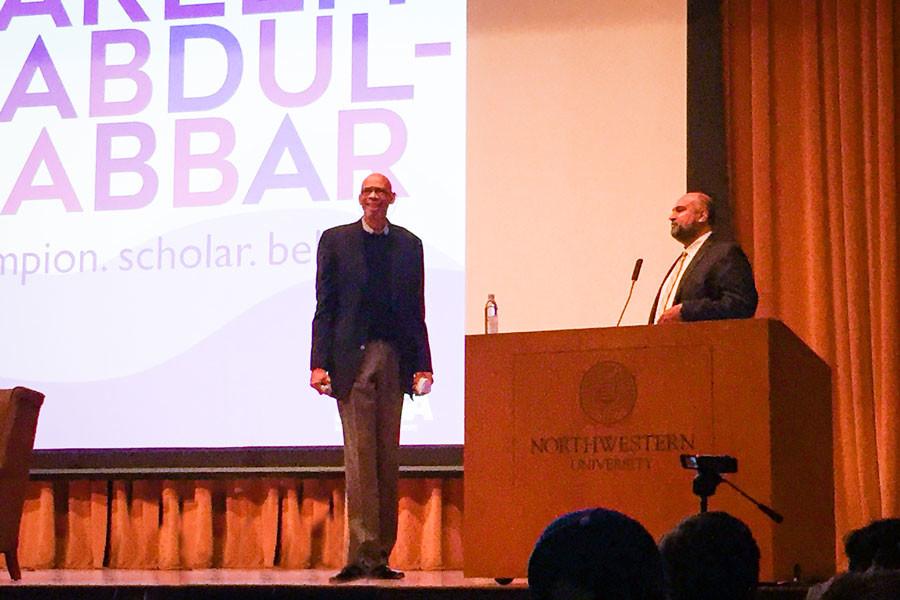Kareem Abdul-Jabbar discusses Muslim identity during talk at Ryan Auditorium
Daniel Tian/Daily Senior Staffer
Kareem Abdul-Jabbar (left) spoke to a crowd of about 300 people Friday at an event partially moderated by Omer Mozaffar (right). The six-time NBA MVP discussed subjects ranging from his Muslim identity to socially conscious athletes.
November 7, 2015
Kareem Abdul-Jabbar came to Northwestern on Friday, speaking on everything from Malcolm X to LeBron James to Black Lives Matter.
Adbul-Jabbar, the NBA’s all-time leading scorer and a best-selling author, drew a standing ovation from an audience of about 300 people at an event sponsored by the Muslim-cultural Students Association inside Ryan Auditorium at the Technological Institute. Over the course of a 30-minute talk, a 30-minute conversation with moderator Omer Mozzaffar, Loyola University Chicago’s chaplain, and a brief audience Q&A, the Hall of Fame basketball center spoke extensively about his identity as a black Muslim.
Adbul Jabbar converted to Islam more than 40 years ago after being exposed to the religion as a freshman at the University of California, Los Angeles.
“I felt that Islam was a great moral anchor for me,” he said. “It was something that enabled me to understand the difference between right and wrong … and it enabled me to be patriotic. I could be a patriotic American and still be a Muslim.”
Abdul-Jabbar, 68, played for the Milwaukee Bucks and the Los Angeles Lakers between 1969 and 1989. A 19-time all-star, he also won six NBA championships and a record six MVP awards in his 20-year career.
Since retiring from basketball in 1989, Abdul-Jabbar has penned multiple New York Times bestsellers on subjects ranging from World War II to the history of African-American inventors. He currently serves as a columnist for Time magazine, writing mostly about race and politics.
When asked about the importance of athletes being socially conscious, Abdul-Jabbar doubled down on his recent criticism of Michael Jordan choosing “commerce over conscience” and commended contemporary athletes like LeBron James for taking political stances.
One of the loudest audience laughs erupted when Abdul-Jabbar was asked about Charles Barkley’s famous assertion in a 1993 Nike commercial that he is, “not a role model.”
“Charles Barkley was right and wrong,” Abdul-Jabbar said. “He isn’t a role model.”
Abdul-Jabbar said his influences as a young man included Malcolm X, Muhammad Ali and former Muslim leader Hamaas Abdul Khaalis (whom he later denounced).
A major theme of Abdul-Jabbar’s talk was that radical groups such as the Islamic State group do not represent Islam as a whole, suggesting the group is to Islam as the Ku Klux Klan is to Christianity. For Abdul-Jabbar, being a high-profile Muslim in America has become more difficult since the terrorist attacks of Sept. 11, 2001. Being what he describes as a very public Muslim, he is now often asked to answer questions like, “Why are Muslims so violent?”
“Prior to 9/11, I was dealing with (religious identity) on my own, mainly under the radar,” he said. “But here comes 9/11 and Muslims are now being portrayed as murderers and enemies of America. And since that day, it’s been a whole different story.”
When asked about the Black Lives Matter movement, Abdul-Jabbar, whose father was a police officer, said law enforcement appears to find fault in everything.
“They seem to have contempt for everyone who doesn’t look like them,” he said.
McSA administrative vice president Medha Imam said Abdul-Jabbar’s talk lived up to the group’s high expectations.
“We really just wanted him to speak to us about his life as a basketball legend and then also his life as a Muslim,” the Medill junior said, “as someone who really has struggled on the path of his journey to Islam, which all of us have.”
Weinberg sophomore Husam Khatir said he enjoyed hearing about Abdul-Jabbar’s conversion from Christianity to Islam and also his jump from basketball player to writer.
“It’s crazy to think he was a professional athlete, greatest scorer of all time, and he just transitioned to being an intellectual like that,” Khatir said.
A previous version of this story mischaracterized Charles Barkley’s comments in a 1993 commercial. Barkley was referring to himself. The Daily regrets the error.
Email: [email protected]
Twitter: @alexputterman


